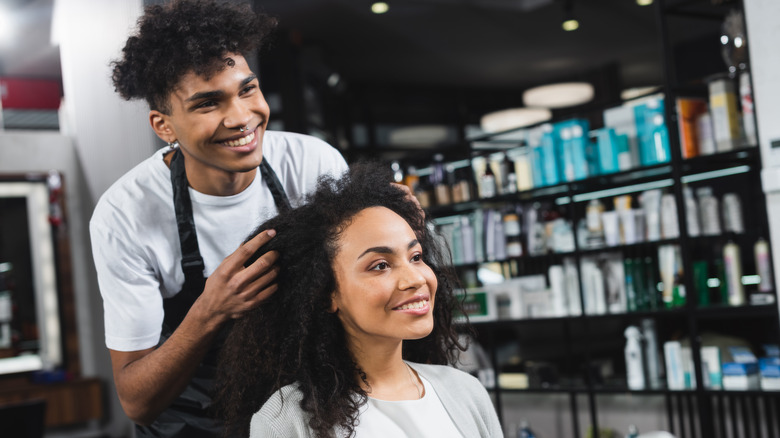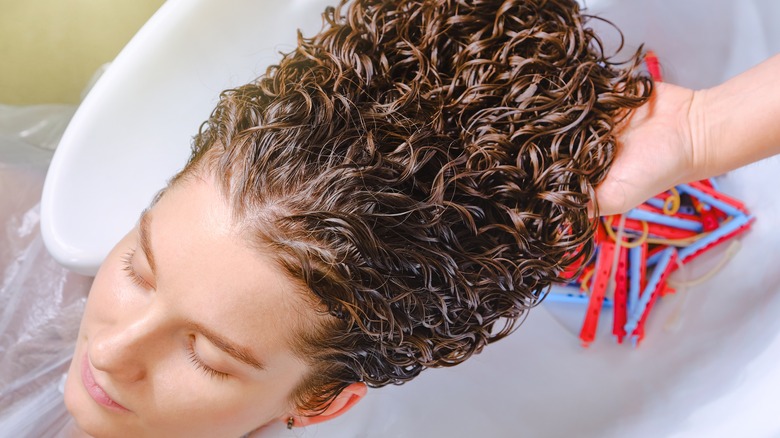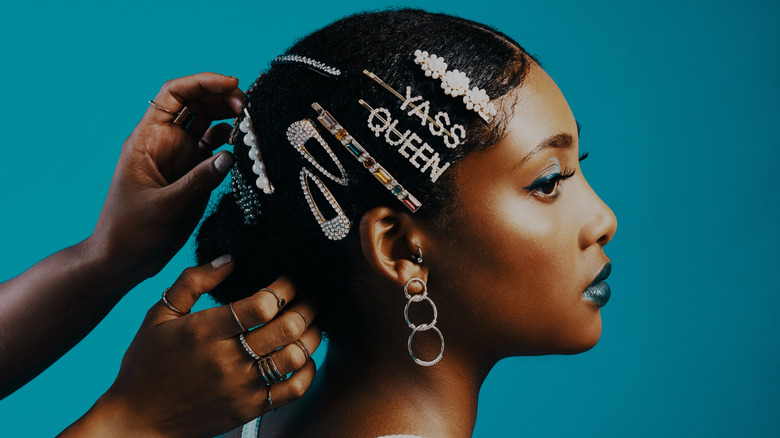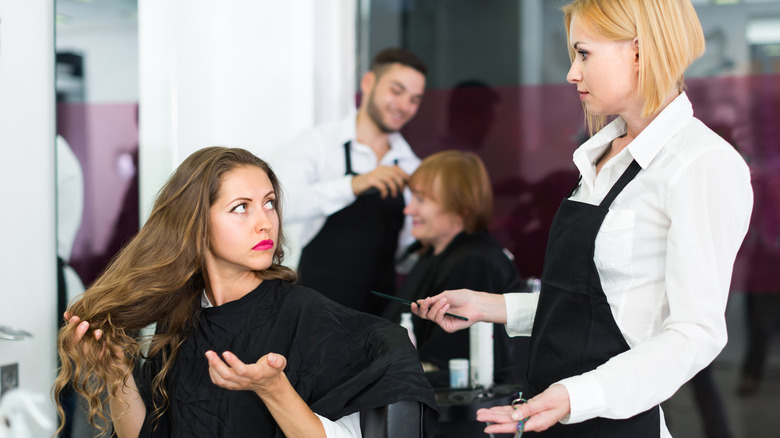PsychoHairapy Is Elevating Your Salon Venting Sesh To A Legitimate Healing Experience
Women deeply understand how visiting the salon to get pampered and styled is not just about getting their hair done and their nails did (to quote Missy Elliott). It is also a self-care practice that asks them to be vulnerable whenever they sit on a salon chair. Unless you are willing to micro-manage every step of the process, trusting your hair stylist, nail technician, and facialist is integral to a salon visit's success, and this can have a significant impact on your mood and self-image.
Given the intimate knowledge hairdressers have about their regular clients' hair concerns, it is easy to see why patrons open up to them naturally about other areas of their lives, including relationship problems such as trust issues. In fact, according to a survey, a majority of Americans find visiting the salon a "therapeutic experience," and one out of three people consider their favorite stylist as their therapist.
This was the seed behind PsychoHairapy, a clinical practice that connects hair care with mental health care. Established in 2020 by clinical psychologist and hair stylist Afiya Mbilishaka, PhD, it trains stylists and barbers to provide emotional relief to clients who confide in them. "They were already trying to support and affirm [clients], but there are certain skills [PsychoHairapy training provides] in terms of listening that [allow them to have] much deeper and meaningful conversations," Dr. Mbilishaka told Byrdie. It also teaches them to refer those who disclose more serious concerns to mental health professionals.
Hair's cultural and psychological significance
Throughout history and across different cultures and literary texts, hair has been closely linked to spirituality and culture, from the biblical story of how Samson lost his strength after getting his leonine mane cut to how various indigenous groups view hair as an extension of one's identity and connection to the community.
Even in today's society, hair isn't just hair. We put emotional weight on our locks' appearance and link it closely to our self-image. We celebrate good hair days, experiment with a new hair color whenever we feel adventurous, and get post-breakup haircuts as part of the grieving process. Because of how relatively easy it is to style and its capacity to grow out, it's the perfect physical feature to change based on how we feel — and for that change to be visible to the public. "[Hair] symbolism is usually voluntary rather than imposed or 'given'," sociologist Anthony Synnott explained in "Shame and Glory: A Sociology of Hair." "[It's] therefore singularly apt to symbolize both differentiations between, and changes in, individual and group identities."
In our desire for our looks to reflect our self-image, we've come to rely not just on our stylists' expertise but also the care they show for our locks. We feel encouraged to divulge personal stories to them, partly so they get a clearer picture of the look we want to achieve and partly because of the intimacy of having them wash and cut our hair.
PsychoHairapy's roots in Black hair and culture
In Black culture, hairdressers and barbers have long been "lay health advisors" who "engage in informal counseling within [their] communities," according to Dr. Mbilishaka in her interview with PsychCentral. She experienced this herself as a Psychology undergraduate who would style her friends' hair as they talked about college life. "I decided to develop [PsychoHairapy] because I never met a Black clinical psychologist until my 20s. My undergraduate courses neglected the Black experience and only referenced Black folks in connection to the overdiagnosis of schizophrenia."
She further connected Black people's reliance on their stylists to the lack of accessible support that specifically addresses race-related mental and physical health issues. "The relationships, according to research in African American communities, between hair care professionals and clients are very tight. ... Black women are more likely to get their hair done than to go to a doctor's appointment," she told The Diamondback.
The salon chair is also a safe space for Black folks from race-based hair discrimination. Here, their natural hair texture is cared for and styled in protective braids, twists, and locs that are otherwise deemed "unprofessional" in the workplace. Even when they choose to adhere to beauty norms that could endanger them (a 2022 study has linked hazardous chemicals in hair relaxers to uterine cancer), they can find empathy and compassion for their hair and life woes in the salon. Dr. Mbilishaka describes these conversations between Black stylists and their clients as "extremely therapeutic."
The limits of venting to your stylist
Although it was created to provide more mental health support to Black people by way of hair care, the principle behind PsychoHairapy is universal: Community-based mental health care is more accessible. It's less expensive than going to a therapist, and there is also less stigma in expressing one's feelings and problems while in the salon.
Stylists who've had some form of mental health training, such as what PsychoHairapy offers, make for active listeners who can put clients at ease so they can process their thoughts and emotions better. They're capable of recognizing when someone is having a mental health crisis and would know how to respectfully refer them to a professional. More importantly, they're aware of and observe proper stylist-client boundaries.
Still, a salon visit isn't a free therapy session. It's wonderful to be able to trust your stylist but to maintain that trust, you also need to respect their limitations, whether or not they're certified in PsychoHairapy. No matter how friendly you've become, venting too much to your stylist is unfair because it asks them to perform extra emotional labor. It adds stress to an already demanding job that highly depends on customer satisfaction. Besides, a stylist who isn't equipped in providing mental health first aid will be unable to offer the support you need. Expecting them to do so could jeopardize your relationship and push you to look for a new one to trust — and that is another crisis in itself.



